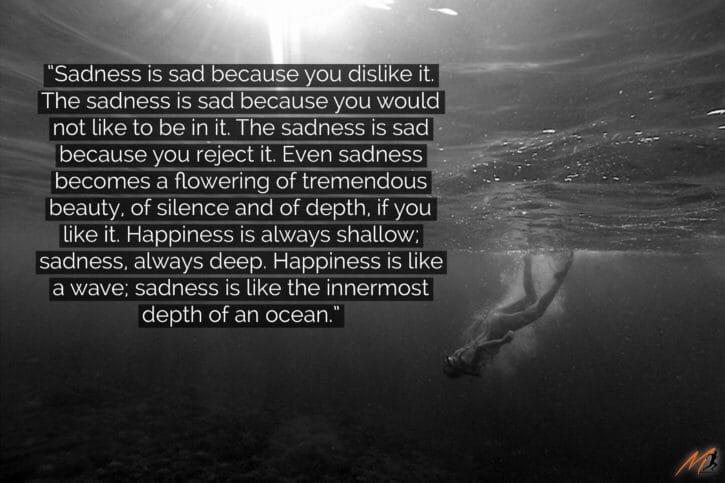“Only dead people never get stressed, never get broken hearts, never experience the disappointment that comes with failure. Tough emotions are part of our contract with life. You don’t get to have a meaningful career or raise a family or leave the world a better place without stress and discomfort. Discomfort is the price of admission to a meaningful life.” ~ Susan David, Ph.D, Mindful
“Research on emotional suppression shows that when emotions are pushed aside or ignored, they get stronger. Psychologists call this amplification. Like that delicious chocolate cake in the refrigerator, the more you try to ignore it, the greater its hold on you. You might think you’re in control of unwanted emotions when you ignore them, but in fact, they control you. Internal pain always comes out. Always. And who pays the price? We do. Our children, our colleagues, our communities.” ~ Susan David, Ph.D, Mindful
“How we deal with our inner world drives everything. Every aspect of how we love, how we live, how we parent and how we lead. The conventional view of emotions as good or bad, positive or negative, is rigid. And rigidity in the face of complexity is toxic. We need greater levels of emotional agility for true resilience and thriving.” ~ Susan David, Ph.D, Mindful
“Men who do not turn to face their own pain are too often prone to inflict it on others.” ~ Terrence Real, I Don’t Want To Talk About It
“In our culture we tend to equate thinking and intellectual powers with success and achievement. In many ways, however, it is an emotional quality that separates those who master a field from the many who simply work at a job. Our levels of desire, patience, persistence, and confidence end up playing a much larger role in success than sheer reasoning powers. Feeling motivated and energized, we can overcome almost anything. Feeling bored and restless, our minds shut off and we become increasingly passive.” ~ Robert Greene, Mastery
Pillow Punching – Good or Bad for Anger Management? [Excerpt]
Excerpt: While pillow punching might seem like a good idea for, “letting off steam” and managing anger, hitting things while angry actually tends to have the opposite effect.
Read More »Pillow Punching – Good or Bad for Anger Management? [Excerpt]
“Denying negative emotions leads to experiencing deeper and more prolonged negative emotions and to emotional dysfunction. Constant positivity is a form of avoidance, not a valid solution to life’s problems—problems which, by the way, if you’re choosing the right values and metrics, should be invigorating you and motivating you.” ~ Mark Mason, The Subtle Art of Not Giving a F*ck
How to Handle Anger – A Mindfulness Exercise from Thich Nhat Hanh [Excerpt]
Excerpt: Learning how to handle anger is a crucial skill for managing relationships with yourself and others. Thich Nhat Hanh can help…
Read More »How to Handle Anger – A Mindfulness Exercise from Thich Nhat Hanh [Excerpt]
“When it comes down to it, if you feel crappy it’s because your brain is telling you that there’s a problem that’s unaddressed or unresolved. In other words, negative emotions are a call to action. When you feel them, it’s because you’re supposed to do something. Positive emotions, on the other hand, are rewards for taking the proper action. When you feel them, life seems simple and there is nothing else to do but enjoy it. Then, like everything else, the positive emotions go away, because more problems inevitably emerge.” ~ Mark Mason, The Subtle Art of Not Giving a F*ck
“The desire for a more positive experience is itself a negative experience. And, paradoxically, the acceptance of one’s negative experience is itself a positive experience.” ~ Mark Mason, The Subtle Art of Not Giving a F*ck







![Pillow Punching - Good or Bad for Anger Management? [Excerpt]](https://movemequotes.com/wp-content/uploads/2017/02/IMG_0380-930x620.jpg)

![How to Handle Anger - A Mindfulness Exercise from Thich Nhat Hanh [Excerpt]](https://movemequotes.com/wp-content/uploads/2017/01/IMG_0273-930x620.jpg)

